-
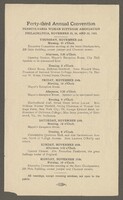 Forty-third Annual Convention Pennsylvania Woman Suffrage Association ephemera, November 23-25 1911
Forty-third Annual Convention Pennsylvania Woman Suffrage Association ephemera, November 23-25 1911 This itinerary details the meetings for the Forty-third Annual Convention for the Pennsylvania Woman Suffrage Association in Philadelphia. Events included executive committee meetings, sessions at the mayor's reception room, and guest talks, including one given by Emmeline Pankhurst, a prominent British suffragists.
-
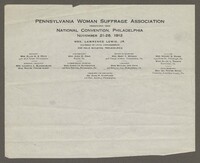 Pennsylvania Woman Suffrage Association National Convention ephemera, November 21-26 1912
Pennsylvania Woman Suffrage Association National Convention ephemera, November 21-26 1912 Letterhead for the Pennsylvania Woman Suffrage Association National Convention in Philadelphia. This item records Association officers, including Dora Kelly Lewis (Mrs. Lawrence Lewis Jr.), chairman, and Caroline Katzenstein, corresponding secretary.
-
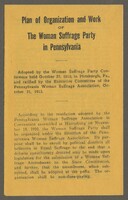 Plan of Organization and Work of the Woman Suffrage Party in Pennsylvania ephemera, 1913
Plan of Organization and Work of the Woman Suffrage Party in Pennsylvania ephemera, 1913 This pamphlet outlines the structure and promotion activities of the Woman Suffrage Party in Pennsylvania. The Party was formed in Harrisburg at the 1910 Pennsylvania Woman Suffrage Association Convention and operated under the direction of the Association.
-
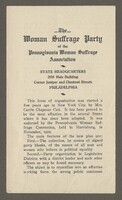 The Woman Suffrage Party of the Pennsylvania Woman Suffrage Association ephemera, 27 October 1911
The Woman Suffrage Party of the Pennsylvania Woman Suffrage Association ephemera, 27 October 1911 This leaflet, distributed by the Pennsylvania Women's Suffrage Association, provides information on the organization and its strategies for promoting women's suffrage.
-
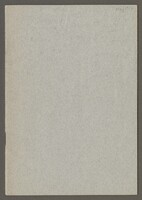 Opinions of Candidates for the Pennsylvania Legislature In Re An Amendment to the State Constitution Granting Political Rights to Women, May 1912
Opinions of Candidates for the Pennsylvania Legislature In Re An Amendment to the State Constitution Granting Political Rights to Women, May 1912 This booklet, put out by the Pennsylvania Women's Suffrage Association, summarizes the opinions of candidates of the state legislature regarding women's suffrage. The survey begins with a brief review of the proposed women's suffrage bill, planks in party platforms related to suffrage, and the questions posited to the candidates themselves.
-
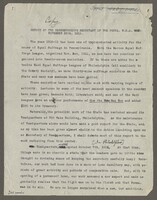 Report of the Corresponding Secretary of the Penna. W.S.A., 25 November 1911
Report of the Corresponding Secretary of the Penna. W.S.A., 25 November 1911 This annual report of the Pennsylvania Women's Suffrage Association details the various activities and events undertaken to promote women's suffrage. In particular, it discusses the founding of a headquarters in the Hale Building in Philadelphia, open-air campaigns, and the dissemination of pamphlets. This report was prepared by Caroline Katzenstein, secretary of the PWSA.
-
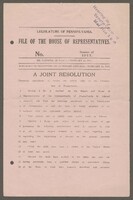 Legislature of Pennsylvania File of the House of Representatives [unnumbered], 1911
Legislature of Pennsylvania File of the House of Representatives [unnumbered], 1911 A copy of a bill proposing changes to the state constitution that would allow women to vote. This proposal was only referred to the Committee on Judiciary General and never read before the Pennsylvania House of Representatives. A similar bill was voted on in the House in 1915, but it failed. In 1919 the state legislature ratified the Nineteenth Amendment.
-
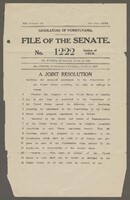 Legislature of Pennsylvania File of the Senate No. 1222 PN 805, 1919
Legislature of Pennsylvania File of the Senate No. 1222 PN 805, 1919 A copy of a bill brought before the Pennsylvania State Senate that proposed the ratification of the Nineteenth Amendment. The Bill was passed in June 27 1919, and Pennsylvania became the eighth state to ratify the Amendment.
-
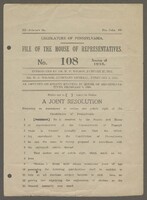 Legislature of Pennsylvania File of the House of Representatives No. 108, 1915
Legislature of Pennsylvania File of the House of Representatives No. 108, 1915 A copy of a bill brought before the Pennsylvania House of Representatives proposing changes to the state constitution that would allow women to vote. The fifth stipulation of the proposal reads: "Wherever the words "he" "his" "him" and "himself" occur in any section of articles VIII of this Constitution the same shall be construed as if written respectively "he or she" "his or her" "him or her" and "himself or herself." The 1915 referendum ultimately failed, but in 1919 the state legislature ratified the Nineteenth Amendment.
-
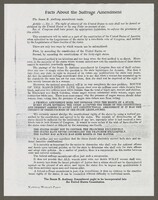 Facts about the Suffrage Amendment, undated
Facts about the Suffrage Amendment, undated A copy of a pamphlet circulated by the National Woman's Party that presents the argument for campaigning on behalf of a federal suffrage amendment instead of state-level amendments.
-
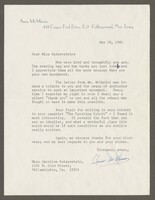 Anna McManus letter to Caroline Katzenstein, 18 May 1965
Anna McManus letter to Caroline Katzenstein, 18 May 1965 Caroline Katzenstein was a prominent suffragist in the years leading up to the Nineteenth Amendment. In addition to her continued support for the Equal Rights Amendment, Katzenstein spent much of her time writing essays and articles under the pseudonym Carol Stone. Her 1939 essay, "The Sporting Spirit," documents her utopian ideals and urges her readers to think in terms of individual morality for the common good. She disseminated her essay to dozens of the most luminous academics and political figures of the time.
-
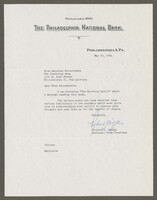 Richard C. Zebley letter to Caroline Katzenstein, 29 May 1964
Richard C. Zebley letter to Caroline Katzenstein, 29 May 1964 Caroline Katzenstein was a prominent suffragist in the years leading up to the Nineteenth Amendment. In addition to her continued support for the Equal Rights Amendment, Katzenstein spent much of her time writing essays and articles under the pseudonym Carol Stone. Her 1939 essay, "The Sporting Spirit," documents her utopian ideals and urges her readers to think in terms of individual morality for the common good. She disseminated her essay to dozens of the most luminous academics and political figures of the time.
-
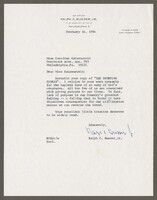 Ralph C. Busser Jr. letter to Caroline Katzenstein, 14 February 1964
Ralph C. Busser Jr. letter to Caroline Katzenstein, 14 February 1964 Caroline Katzenstein was a prominent suffragist in the years leading up to the Nineteenth Amendment. In addition to her continued support for the Equal Rights Amendment, Katzenstein spent much of her time writing essays and articles under the pseudonym Carol Stone. Her 1939 essay, "The Sporting Spirit," documents her utopian ideals and urges her readers to think in terms of individual morality for the common good. She disseminated her essay to dozens of the most luminous academics and political figures of the time.
-
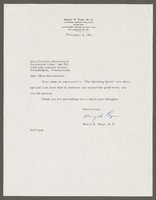 Henry F. Page letter to Caroline Katzenstein, 4 November 1963
Henry F. Page letter to Caroline Katzenstein, 4 November 1963 Caroline Katzenstein was a prominent suffragist in the years leading up to the Nineteenth Amendment. In addition to her continued support for the Equal Rights Amendment, Katzenstein spent much of her time writing essays and articles under the pseudonym Carol Stone. Her 1939 essay, "The Sporting Spirit," documents her utopian ideals and urges her readers to think in terms of individual morality for the common good. She disseminated her essay to dozens of the most luminous academics and political figures of the time.
-
 William H. Spencer letter to Caroline Katzenstein, 20 May 1957
William H. Spencer letter to Caroline Katzenstein, 20 May 1957 Caroline Katzenstein was a prominent suffragist in the years leading up to the Nineteenth Amendment. In addition to her continued support for the Equal Rights Amendment, Katzenstein spent much of her time writing essays and articles under the pseudonym Carol Stone. Her 1939 essay, "The Sporting Spirit," documents her utopian ideals and urges her readers to think in terms of individual morality for the common good. She disseminated her essay to dozens of the most luminous academics and political figures of the time.
-
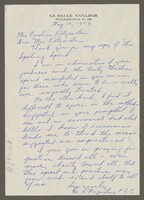 Brother D. Augustine letter to Caroline Katzenstein, 13 May 1956
Brother D. Augustine letter to Caroline Katzenstein, 13 May 1956 Caroline Katzenstein was a prominent suffragist during the years leading up to the Nineteenth Amendment. In addition to her continued support for the Equal Rights Amendment, she spent much of her time writing essays and articles under the pseudonym Carol Stone. Her 1939 essay, "The Sporting Spirit," documents her utopian ideals, urging her readers to think in terms of individual morality for the common good. She disseminated her pamphlet to dozens of the most luminous academics and political figures of the time. This letter is from Brother D. Augustine, the Chair of the Department of Sociology at La Salle College.
-
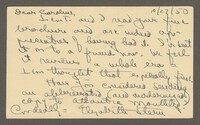 Letter to Caroline Katzenstein, 27 October 1950
Letter to Caroline Katzenstein, 27 October 1950 Caroline Katzenstein was a prominent suffragist in the years leading up to the Nineteenth Amendment. In addition to her continued support for the Equal Rights Amendment, Katzenstein spent much of her time writing essays and articles under the pseudonym Carol Stone. Her 1939 essay, "The Sporting Spirit," documents her utopian ideals and urges her readers to think in terms of individual morality for the common good. She disseminated her essay to dozens of the most luminous academics and political figures of the time.
-
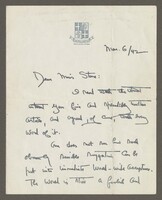 Letter to Carol Stone, 6 March 1942
Letter to Carol Stone, 6 March 1942 Caroline Katzenstein was a prominent suffragist in the years leading up to the Nineteenth Amendment. In addition to her continued support for the Equal Rights Amendment, Katzenstein spent much of her time writing essays and articles under the pseudonym Carol Stone. Her 1939 essay, "The Sporting Spirit," documents her utopian ideals and urges her readers to think in terms of individual morality for the common good. She disseminated her essay to dozens of the most luminous academics and political figures of the time.
-
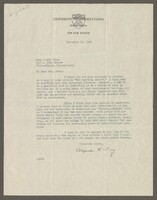 Alexander H. Frey letter to Carol Stone [Caroline Katzenstein], 15 November 1940
Alexander H. Frey letter to Carol Stone [Caroline Katzenstein], 15 November 1940 Caroline Katzenstein was a prominent suffragist in the years leading up to the Nineteenth Amendment. In addition to her continued support for the Equal Rights Amendment, Katzenstein spent much of her time writing essays and articles under the pseudonym Carol Stone. Her 1939 essay, "The Sporting Spirit," documents her utopian ideals and urges her readers to think in terms of individual morality for the common good. She disseminated her essay to dozens of the most luminous academics and political figures of the time. This letter is from Alexander Frey, a professor at the University of Pennsylvania's Law School.
-
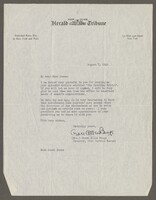 Grace Allen Bangs letter to Carol Stone [Caroline Katzenstein], 7 August 1940
Grace Allen Bangs letter to Carol Stone [Caroline Katzenstein], 7 August 1940 Caroline Katzenstein was a prominent suffragist in the years leading up to the Nineteenth Amendment. In addition to her continued support for the Equal Rights Amendment, Katzenstein spent much of her time writing essays and articles under the pseudonym Carol Stone. Her 1939 essay, "The Sporting Spirit," documents her utopian ideals and urges her readers to think in terms of individual morality for the common good. She disseminated her essay to dozens of the most luminous academics and political figures of the time. This letter is from Grace Allen Bangs, the head of the New York Herald Tribune's Club Service Bureau.
-
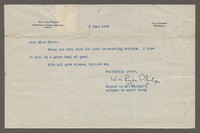 William Lyon Phelps letter to Carol Stone [Caroline Katzenstein], 5 June 1940
William Lyon Phelps letter to Carol Stone [Caroline Katzenstein], 5 June 1940 Caroline Katzenstein was a prominent suffragist in the years leading up to the Nineteenth Amendment. In addition to her continued support for the Equal Rights Amendment, Katzenstein spent much of her time writing essays and articles under the pseudonym Carol Stone. Her 1939 essay, "The Sporting Spirit," documents her utopian ideals and urges her readers to think in terms of individual morality for the common good. She disseminated her essay to dozens of the most luminous academics and political figures of the time. This letter is from William Lyon Phelps, an American writer and professor of literature at Yale University.
-
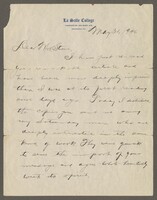 Brother Alfred letter to Carol Stone [Caroline Katzenstein], 31 May 1940
Brother Alfred letter to Carol Stone [Caroline Katzenstein], 31 May 1940 Caroline Katzenstein was a prominent suffragist in the years leading up to the Nineteenth Amendment. In addition to her continued support for the Equal Rights Amendment, Katzenstein spent much of her time writing essays and articles under the pseudonym Carol Stone. Her 1939 essay, "The Sporting Spirit," documents her utopian ideals and urges her readers to think in terms of individual morality for the common good. She disseminated her essay to dozens of the most luminous academics and political figures of the time. This letter is from Brother Alfred, president of La Salle College.
-
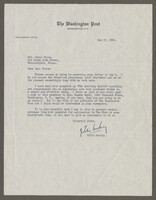 Felix Morley letter to Carol Stone [Caroline Katzenstein], 23 May 1940
Felix Morley letter to Carol Stone [Caroline Katzenstein], 23 May 1940 Caroline Katzenstein was a prominent suffragist in the years leading up to the Nineteenth Amendment. In addition to her continued support for the Equal Rights Amendment, Katzenstein spent much of her time writing essays and articles under the pseudonym Carol Stone. Her 1939 essay, "The Sporting Spirit," documents her utopian ideals and urges her readers to think in terms of individual morality for the common good. She disseminated her essay to dozens of the most luminous academics and political figures of the time. She disseminated her pamphlet to dozens of the most luminous academics and political figures of the time. This letter is from Felix Morley, an editor for the Washington Post and Pulitzer Prize winner.
-
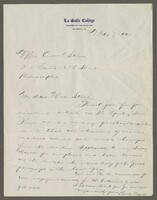 Brother Alfred letter to Carol Stone [Caroline Katzenstein], 7 May 1940
Brother Alfred letter to Carol Stone [Caroline Katzenstein], 7 May 1940 Caroline Katzenstein was a prominent suffragist in the years leading up to the Nineteenth Amendment. In addition to her continued support for the Equal Rights Amendment, Katzenstein spent much of her time writing essays and articles under the pseudonym Carol Stone. Her 1939 essay, "The Sporting Spirit," documents her utopian ideals and urges her readers to think in terms of individual morality for the common good. She disseminated her essay to dozens of the most luminous academics and political figures of the time. This letter is from Brother Alfred, president of La Salle College.
-
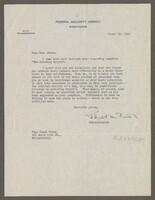 Paul V. McNutt letter to Carol Stone [Caroline Katzenstein], 28 March 1940
Paul V. McNutt letter to Carol Stone [Caroline Katzenstein], 28 March 1940 Caroline Katzenstein was a prominent suffragist in the years leading up to the Nineteenth Amendment. In addition to her continued support for the Equal Rights Amendment, Katzenstein spent much of her time writing essays and articles under the pseudonym Carol Stone. Her 1939 essay, "The Sporting Spirit," documents her utopian ideals and urges her readers to think in terms of individual morality for the common good. She disseminated her essay to dozens of the most luminous academics and political figures of the time. This letter is from Paul McNutt, an American diplomat and Administrator of the Federal Security Agency.
 Forty-third Annual Convention Pennsylvania Woman Suffrage Association ephemera, November 23-25 1911 This itinerary details the meetings for the Forty-third Annual Convention for the Pennsylvania Woman Suffrage Association in Philadelphia. Events included executive committee meetings, sessions at the mayor's reception room, and guest talks, including one given by Emmeline Pankhurst, a prominent British suffragists.
Forty-third Annual Convention Pennsylvania Woman Suffrage Association ephemera, November 23-25 1911 This itinerary details the meetings for the Forty-third Annual Convention for the Pennsylvania Woman Suffrage Association in Philadelphia. Events included executive committee meetings, sessions at the mayor's reception room, and guest talks, including one given by Emmeline Pankhurst, a prominent British suffragists. Pennsylvania Woman Suffrage Association National Convention ephemera, November 21-26 1912 Letterhead for the Pennsylvania Woman Suffrage Association National Convention in Philadelphia. This item records Association officers, including Dora Kelly Lewis (Mrs. Lawrence Lewis Jr.), chairman, and Caroline Katzenstein, corresponding secretary.
Pennsylvania Woman Suffrage Association National Convention ephemera, November 21-26 1912 Letterhead for the Pennsylvania Woman Suffrage Association National Convention in Philadelphia. This item records Association officers, including Dora Kelly Lewis (Mrs. Lawrence Lewis Jr.), chairman, and Caroline Katzenstein, corresponding secretary. Plan of Organization and Work of the Woman Suffrage Party in Pennsylvania ephemera, 1913 This pamphlet outlines the structure and promotion activities of the Woman Suffrage Party in Pennsylvania. The Party was formed in Harrisburg at the 1910 Pennsylvania Woman Suffrage Association Convention and operated under the direction of the Association.
Plan of Organization and Work of the Woman Suffrage Party in Pennsylvania ephemera, 1913 This pamphlet outlines the structure and promotion activities of the Woman Suffrage Party in Pennsylvania. The Party was formed in Harrisburg at the 1910 Pennsylvania Woman Suffrage Association Convention and operated under the direction of the Association. The Woman Suffrage Party of the Pennsylvania Woman Suffrage Association ephemera, 27 October 1911 This leaflet, distributed by the Pennsylvania Women's Suffrage Association, provides information on the organization and its strategies for promoting women's suffrage.
The Woman Suffrage Party of the Pennsylvania Woman Suffrage Association ephemera, 27 October 1911 This leaflet, distributed by the Pennsylvania Women's Suffrage Association, provides information on the organization and its strategies for promoting women's suffrage. Opinions of Candidates for the Pennsylvania Legislature In Re An Amendment to the State Constitution Granting Political Rights to Women, May 1912 This booklet, put out by the Pennsylvania Women's Suffrage Association, summarizes the opinions of candidates of the state legislature regarding women's suffrage. The survey begins with a brief review of the proposed women's suffrage bill, planks in party platforms related to suffrage, and the questions posited to the candidates themselves.
Opinions of Candidates for the Pennsylvania Legislature In Re An Amendment to the State Constitution Granting Political Rights to Women, May 1912 This booklet, put out by the Pennsylvania Women's Suffrage Association, summarizes the opinions of candidates of the state legislature regarding women's suffrage. The survey begins with a brief review of the proposed women's suffrage bill, planks in party platforms related to suffrage, and the questions posited to the candidates themselves. Report of the Corresponding Secretary of the Penna. W.S.A., 25 November 1911 This annual report of the Pennsylvania Women's Suffrage Association details the various activities and events undertaken to promote women's suffrage. In particular, it discusses the founding of a headquarters in the Hale Building in Philadelphia, open-air campaigns, and the dissemination of pamphlets. This report was prepared by Caroline Katzenstein, secretary of the PWSA.
Report of the Corresponding Secretary of the Penna. W.S.A., 25 November 1911 This annual report of the Pennsylvania Women's Suffrage Association details the various activities and events undertaken to promote women's suffrage. In particular, it discusses the founding of a headquarters in the Hale Building in Philadelphia, open-air campaigns, and the dissemination of pamphlets. This report was prepared by Caroline Katzenstein, secretary of the PWSA. Legislature of Pennsylvania File of the House of Representatives [unnumbered], 1911 A copy of a bill proposing changes to the state constitution that would allow women to vote. This proposal was only referred to the Committee on Judiciary General and never read before the Pennsylvania House of Representatives. A similar bill was voted on in the House in 1915, but it failed. In 1919 the state legislature ratified the Nineteenth Amendment.
Legislature of Pennsylvania File of the House of Representatives [unnumbered], 1911 A copy of a bill proposing changes to the state constitution that would allow women to vote. This proposal was only referred to the Committee on Judiciary General and never read before the Pennsylvania House of Representatives. A similar bill was voted on in the House in 1915, but it failed. In 1919 the state legislature ratified the Nineteenth Amendment. Legislature of Pennsylvania File of the Senate No. 1222 PN 805, 1919 A copy of a bill brought before the Pennsylvania State Senate that proposed the ratification of the Nineteenth Amendment. The Bill was passed in June 27 1919, and Pennsylvania became the eighth state to ratify the Amendment.
Legislature of Pennsylvania File of the Senate No. 1222 PN 805, 1919 A copy of a bill brought before the Pennsylvania State Senate that proposed the ratification of the Nineteenth Amendment. The Bill was passed in June 27 1919, and Pennsylvania became the eighth state to ratify the Amendment. Legislature of Pennsylvania File of the House of Representatives No. 108, 1915 A copy of a bill brought before the Pennsylvania House of Representatives proposing changes to the state constitution that would allow women to vote. The fifth stipulation of the proposal reads: "Wherever the words "he" "his" "him" and "himself" occur in any section of articles VIII of this Constitution the same shall be construed as if written respectively "he or she" "his or her" "him or her" and "himself or herself." The 1915 referendum ultimately failed, but in 1919 the state legislature ratified the Nineteenth Amendment.
Legislature of Pennsylvania File of the House of Representatives No. 108, 1915 A copy of a bill brought before the Pennsylvania House of Representatives proposing changes to the state constitution that would allow women to vote. The fifth stipulation of the proposal reads: "Wherever the words "he" "his" "him" and "himself" occur in any section of articles VIII of this Constitution the same shall be construed as if written respectively "he or she" "his or her" "him or her" and "himself or herself." The 1915 referendum ultimately failed, but in 1919 the state legislature ratified the Nineteenth Amendment. Facts about the Suffrage Amendment, undated A copy of a pamphlet circulated by the National Woman's Party that presents the argument for campaigning on behalf of a federal suffrage amendment instead of state-level amendments.
Facts about the Suffrage Amendment, undated A copy of a pamphlet circulated by the National Woman's Party that presents the argument for campaigning on behalf of a federal suffrage amendment instead of state-level amendments. Anna McManus letter to Caroline Katzenstein, 18 May 1965 Caroline Katzenstein was a prominent suffragist in the years leading up to the Nineteenth Amendment. In addition to her continued support for the Equal Rights Amendment, Katzenstein spent much of her time writing essays and articles under the pseudonym Carol Stone. Her 1939 essay, "The Sporting Spirit," documents her utopian ideals and urges her readers to think in terms of individual morality for the common good. She disseminated her essay to dozens of the most luminous academics and political figures of the time.
Anna McManus letter to Caroline Katzenstein, 18 May 1965 Caroline Katzenstein was a prominent suffragist in the years leading up to the Nineteenth Amendment. In addition to her continued support for the Equal Rights Amendment, Katzenstein spent much of her time writing essays and articles under the pseudonym Carol Stone. Her 1939 essay, "The Sporting Spirit," documents her utopian ideals and urges her readers to think in terms of individual morality for the common good. She disseminated her essay to dozens of the most luminous academics and political figures of the time. Richard C. Zebley letter to Caroline Katzenstein, 29 May 1964 Caroline Katzenstein was a prominent suffragist in the years leading up to the Nineteenth Amendment. In addition to her continued support for the Equal Rights Amendment, Katzenstein spent much of her time writing essays and articles under the pseudonym Carol Stone. Her 1939 essay, "The Sporting Spirit," documents her utopian ideals and urges her readers to think in terms of individual morality for the common good. She disseminated her essay to dozens of the most luminous academics and political figures of the time.
Richard C. Zebley letter to Caroline Katzenstein, 29 May 1964 Caroline Katzenstein was a prominent suffragist in the years leading up to the Nineteenth Amendment. In addition to her continued support for the Equal Rights Amendment, Katzenstein spent much of her time writing essays and articles under the pseudonym Carol Stone. Her 1939 essay, "The Sporting Spirit," documents her utopian ideals and urges her readers to think in terms of individual morality for the common good. She disseminated her essay to dozens of the most luminous academics and political figures of the time. Ralph C. Busser Jr. letter to Caroline Katzenstein, 14 February 1964 Caroline Katzenstein was a prominent suffragist in the years leading up to the Nineteenth Amendment. In addition to her continued support for the Equal Rights Amendment, Katzenstein spent much of her time writing essays and articles under the pseudonym Carol Stone. Her 1939 essay, "The Sporting Spirit," documents her utopian ideals and urges her readers to think in terms of individual morality for the common good. She disseminated her essay to dozens of the most luminous academics and political figures of the time.
Ralph C. Busser Jr. letter to Caroline Katzenstein, 14 February 1964 Caroline Katzenstein was a prominent suffragist in the years leading up to the Nineteenth Amendment. In addition to her continued support for the Equal Rights Amendment, Katzenstein spent much of her time writing essays and articles under the pseudonym Carol Stone. Her 1939 essay, "The Sporting Spirit," documents her utopian ideals and urges her readers to think in terms of individual morality for the common good. She disseminated her essay to dozens of the most luminous academics and political figures of the time. Henry F. Page letter to Caroline Katzenstein, 4 November 1963 Caroline Katzenstein was a prominent suffragist in the years leading up to the Nineteenth Amendment. In addition to her continued support for the Equal Rights Amendment, Katzenstein spent much of her time writing essays and articles under the pseudonym Carol Stone. Her 1939 essay, "The Sporting Spirit," documents her utopian ideals and urges her readers to think in terms of individual morality for the common good. She disseminated her essay to dozens of the most luminous academics and political figures of the time.
Henry F. Page letter to Caroline Katzenstein, 4 November 1963 Caroline Katzenstein was a prominent suffragist in the years leading up to the Nineteenth Amendment. In addition to her continued support for the Equal Rights Amendment, Katzenstein spent much of her time writing essays and articles under the pseudonym Carol Stone. Her 1939 essay, "The Sporting Spirit," documents her utopian ideals and urges her readers to think in terms of individual morality for the common good. She disseminated her essay to dozens of the most luminous academics and political figures of the time. William H. Spencer letter to Caroline Katzenstein, 20 May 1957 Caroline Katzenstein was a prominent suffragist in the years leading up to the Nineteenth Amendment. In addition to her continued support for the Equal Rights Amendment, Katzenstein spent much of her time writing essays and articles under the pseudonym Carol Stone. Her 1939 essay, "The Sporting Spirit," documents her utopian ideals and urges her readers to think in terms of individual morality for the common good. She disseminated her essay to dozens of the most luminous academics and political figures of the time.
William H. Spencer letter to Caroline Katzenstein, 20 May 1957 Caroline Katzenstein was a prominent suffragist in the years leading up to the Nineteenth Amendment. In addition to her continued support for the Equal Rights Amendment, Katzenstein spent much of her time writing essays and articles under the pseudonym Carol Stone. Her 1939 essay, "The Sporting Spirit," documents her utopian ideals and urges her readers to think in terms of individual morality for the common good. She disseminated her essay to dozens of the most luminous academics and political figures of the time. Brother D. Augustine letter to Caroline Katzenstein, 13 May 1956 Caroline Katzenstein was a prominent suffragist during the years leading up to the Nineteenth Amendment. In addition to her continued support for the Equal Rights Amendment, she spent much of her time writing essays and articles under the pseudonym Carol Stone. Her 1939 essay, "The Sporting Spirit," documents her utopian ideals, urging her readers to think in terms of individual morality for the common good. She disseminated her pamphlet to dozens of the most luminous academics and political figures of the time. This letter is from Brother D. Augustine, the Chair of the Department of Sociology at La Salle College.
Brother D. Augustine letter to Caroline Katzenstein, 13 May 1956 Caroline Katzenstein was a prominent suffragist during the years leading up to the Nineteenth Amendment. In addition to her continued support for the Equal Rights Amendment, she spent much of her time writing essays and articles under the pseudonym Carol Stone. Her 1939 essay, "The Sporting Spirit," documents her utopian ideals, urging her readers to think in terms of individual morality for the common good. She disseminated her pamphlet to dozens of the most luminous academics and political figures of the time. This letter is from Brother D. Augustine, the Chair of the Department of Sociology at La Salle College. Letter to Caroline Katzenstein, 27 October 1950 Caroline Katzenstein was a prominent suffragist in the years leading up to the Nineteenth Amendment. In addition to her continued support for the Equal Rights Amendment, Katzenstein spent much of her time writing essays and articles under the pseudonym Carol Stone. Her 1939 essay, "The Sporting Spirit," documents her utopian ideals and urges her readers to think in terms of individual morality for the common good. She disseminated her essay to dozens of the most luminous academics and political figures of the time.
Letter to Caroline Katzenstein, 27 October 1950 Caroline Katzenstein was a prominent suffragist in the years leading up to the Nineteenth Amendment. In addition to her continued support for the Equal Rights Amendment, Katzenstein spent much of her time writing essays and articles under the pseudonym Carol Stone. Her 1939 essay, "The Sporting Spirit," documents her utopian ideals and urges her readers to think in terms of individual morality for the common good. She disseminated her essay to dozens of the most luminous academics and political figures of the time. Letter to Carol Stone, 6 March 1942 Caroline Katzenstein was a prominent suffragist in the years leading up to the Nineteenth Amendment. In addition to her continued support for the Equal Rights Amendment, Katzenstein spent much of her time writing essays and articles under the pseudonym Carol Stone. Her 1939 essay, "The Sporting Spirit," documents her utopian ideals and urges her readers to think in terms of individual morality for the common good. She disseminated her essay to dozens of the most luminous academics and political figures of the time.
Letter to Carol Stone, 6 March 1942 Caroline Katzenstein was a prominent suffragist in the years leading up to the Nineteenth Amendment. In addition to her continued support for the Equal Rights Amendment, Katzenstein spent much of her time writing essays and articles under the pseudonym Carol Stone. Her 1939 essay, "The Sporting Spirit," documents her utopian ideals and urges her readers to think in terms of individual morality for the common good. She disseminated her essay to dozens of the most luminous academics and political figures of the time. Alexander H. Frey letter to Carol Stone [Caroline Katzenstein], 15 November 1940 Caroline Katzenstein was a prominent suffragist in the years leading up to the Nineteenth Amendment. In addition to her continued support for the Equal Rights Amendment, Katzenstein spent much of her time writing essays and articles under the pseudonym Carol Stone. Her 1939 essay, "The Sporting Spirit," documents her utopian ideals and urges her readers to think in terms of individual morality for the common good. She disseminated her essay to dozens of the most luminous academics and political figures of the time. This letter is from Alexander Frey, a professor at the University of Pennsylvania's Law School.
Alexander H. Frey letter to Carol Stone [Caroline Katzenstein], 15 November 1940 Caroline Katzenstein was a prominent suffragist in the years leading up to the Nineteenth Amendment. In addition to her continued support for the Equal Rights Amendment, Katzenstein spent much of her time writing essays and articles under the pseudonym Carol Stone. Her 1939 essay, "The Sporting Spirit," documents her utopian ideals and urges her readers to think in terms of individual morality for the common good. She disseminated her essay to dozens of the most luminous academics and political figures of the time. This letter is from Alexander Frey, a professor at the University of Pennsylvania's Law School. Grace Allen Bangs letter to Carol Stone [Caroline Katzenstein], 7 August 1940 Caroline Katzenstein was a prominent suffragist in the years leading up to the Nineteenth Amendment. In addition to her continued support for the Equal Rights Amendment, Katzenstein spent much of her time writing essays and articles under the pseudonym Carol Stone. Her 1939 essay, "The Sporting Spirit," documents her utopian ideals and urges her readers to think in terms of individual morality for the common good. She disseminated her essay to dozens of the most luminous academics and political figures of the time. This letter is from Grace Allen Bangs, the head of the New York Herald Tribune's Club Service Bureau.
Grace Allen Bangs letter to Carol Stone [Caroline Katzenstein], 7 August 1940 Caroline Katzenstein was a prominent suffragist in the years leading up to the Nineteenth Amendment. In addition to her continued support for the Equal Rights Amendment, Katzenstein spent much of her time writing essays and articles under the pseudonym Carol Stone. Her 1939 essay, "The Sporting Spirit," documents her utopian ideals and urges her readers to think in terms of individual morality for the common good. She disseminated her essay to dozens of the most luminous academics and political figures of the time. This letter is from Grace Allen Bangs, the head of the New York Herald Tribune's Club Service Bureau. William Lyon Phelps letter to Carol Stone [Caroline Katzenstein], 5 June 1940 Caroline Katzenstein was a prominent suffragist in the years leading up to the Nineteenth Amendment. In addition to her continued support for the Equal Rights Amendment, Katzenstein spent much of her time writing essays and articles under the pseudonym Carol Stone. Her 1939 essay, "The Sporting Spirit," documents her utopian ideals and urges her readers to think in terms of individual morality for the common good. She disseminated her essay to dozens of the most luminous academics and political figures of the time. This letter is from William Lyon Phelps, an American writer and professor of literature at Yale University.
William Lyon Phelps letter to Carol Stone [Caroline Katzenstein], 5 June 1940 Caroline Katzenstein was a prominent suffragist in the years leading up to the Nineteenth Amendment. In addition to her continued support for the Equal Rights Amendment, Katzenstein spent much of her time writing essays and articles under the pseudonym Carol Stone. Her 1939 essay, "The Sporting Spirit," documents her utopian ideals and urges her readers to think in terms of individual morality for the common good. She disseminated her essay to dozens of the most luminous academics and political figures of the time. This letter is from William Lyon Phelps, an American writer and professor of literature at Yale University. Brother Alfred letter to Carol Stone [Caroline Katzenstein], 31 May 1940 Caroline Katzenstein was a prominent suffragist in the years leading up to the Nineteenth Amendment. In addition to her continued support for the Equal Rights Amendment, Katzenstein spent much of her time writing essays and articles under the pseudonym Carol Stone. Her 1939 essay, "The Sporting Spirit," documents her utopian ideals and urges her readers to think in terms of individual morality for the common good. She disseminated her essay to dozens of the most luminous academics and political figures of the time. This letter is from Brother Alfred, president of La Salle College.
Brother Alfred letter to Carol Stone [Caroline Katzenstein], 31 May 1940 Caroline Katzenstein was a prominent suffragist in the years leading up to the Nineteenth Amendment. In addition to her continued support for the Equal Rights Amendment, Katzenstein spent much of her time writing essays and articles under the pseudonym Carol Stone. Her 1939 essay, "The Sporting Spirit," documents her utopian ideals and urges her readers to think in terms of individual morality for the common good. She disseminated her essay to dozens of the most luminous academics and political figures of the time. This letter is from Brother Alfred, president of La Salle College. Felix Morley letter to Carol Stone [Caroline Katzenstein], 23 May 1940 Caroline Katzenstein was a prominent suffragist in the years leading up to the Nineteenth Amendment. In addition to her continued support for the Equal Rights Amendment, Katzenstein spent much of her time writing essays and articles under the pseudonym Carol Stone. Her 1939 essay, "The Sporting Spirit," documents her utopian ideals and urges her readers to think in terms of individual morality for the common good. She disseminated her essay to dozens of the most luminous academics and political figures of the time. She disseminated her pamphlet to dozens of the most luminous academics and political figures of the time. This letter is from Felix Morley, an editor for the Washington Post and Pulitzer Prize winner.
Felix Morley letter to Carol Stone [Caroline Katzenstein], 23 May 1940 Caroline Katzenstein was a prominent suffragist in the years leading up to the Nineteenth Amendment. In addition to her continued support for the Equal Rights Amendment, Katzenstein spent much of her time writing essays and articles under the pseudonym Carol Stone. Her 1939 essay, "The Sporting Spirit," documents her utopian ideals and urges her readers to think in terms of individual morality for the common good. She disseminated her essay to dozens of the most luminous academics and political figures of the time. She disseminated her pamphlet to dozens of the most luminous academics and political figures of the time. This letter is from Felix Morley, an editor for the Washington Post and Pulitzer Prize winner. Brother Alfred letter to Carol Stone [Caroline Katzenstein], 7 May 1940 Caroline Katzenstein was a prominent suffragist in the years leading up to the Nineteenth Amendment. In addition to her continued support for the Equal Rights Amendment, Katzenstein spent much of her time writing essays and articles under the pseudonym Carol Stone. Her 1939 essay, "The Sporting Spirit," documents her utopian ideals and urges her readers to think in terms of individual morality for the common good. She disseminated her essay to dozens of the most luminous academics and political figures of the time. This letter is from Brother Alfred, president of La Salle College.
Brother Alfred letter to Carol Stone [Caroline Katzenstein], 7 May 1940 Caroline Katzenstein was a prominent suffragist in the years leading up to the Nineteenth Amendment. In addition to her continued support for the Equal Rights Amendment, Katzenstein spent much of her time writing essays and articles under the pseudonym Carol Stone. Her 1939 essay, "The Sporting Spirit," documents her utopian ideals and urges her readers to think in terms of individual morality for the common good. She disseminated her essay to dozens of the most luminous academics and political figures of the time. This letter is from Brother Alfred, president of La Salle College. Paul V. McNutt letter to Carol Stone [Caroline Katzenstein], 28 March 1940 Caroline Katzenstein was a prominent suffragist in the years leading up to the Nineteenth Amendment. In addition to her continued support for the Equal Rights Amendment, Katzenstein spent much of her time writing essays and articles under the pseudonym Carol Stone. Her 1939 essay, "The Sporting Spirit," documents her utopian ideals and urges her readers to think in terms of individual morality for the common good. She disseminated her essay to dozens of the most luminous academics and political figures of the time. This letter is from Paul McNutt, an American diplomat and Administrator of the Federal Security Agency.
Paul V. McNutt letter to Carol Stone [Caroline Katzenstein], 28 March 1940 Caroline Katzenstein was a prominent suffragist in the years leading up to the Nineteenth Amendment. In addition to her continued support for the Equal Rights Amendment, Katzenstein spent much of her time writing essays and articles under the pseudonym Carol Stone. Her 1939 essay, "The Sporting Spirit," documents her utopian ideals and urges her readers to think in terms of individual morality for the common good. She disseminated her essay to dozens of the most luminous academics and political figures of the time. This letter is from Paul McNutt, an American diplomat and Administrator of the Federal Security Agency.